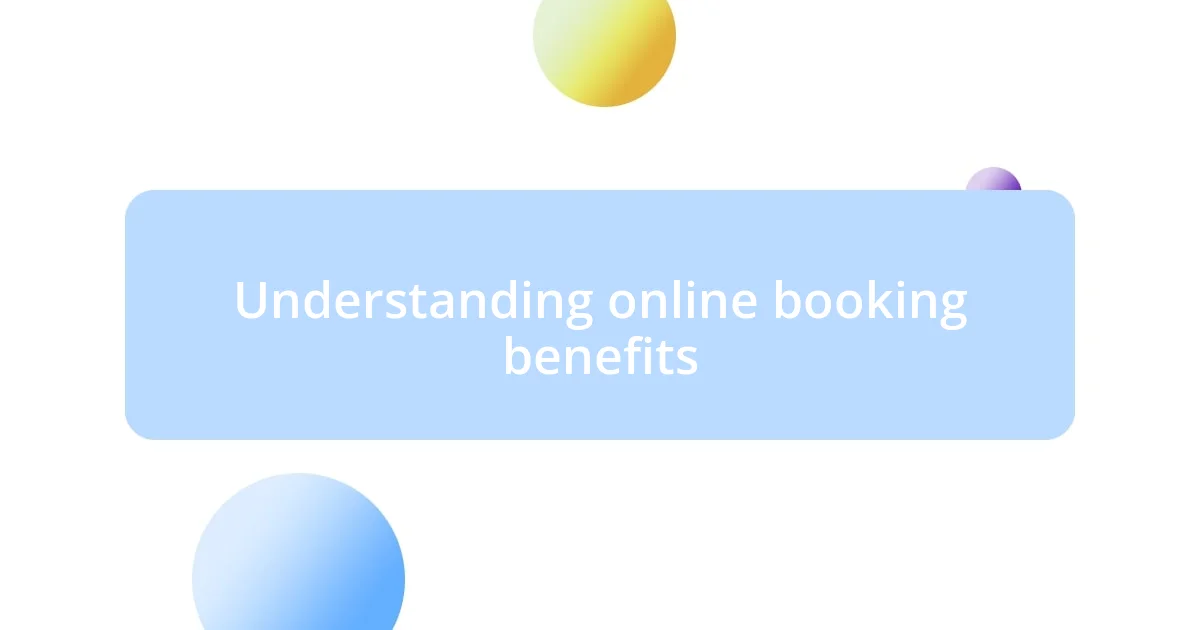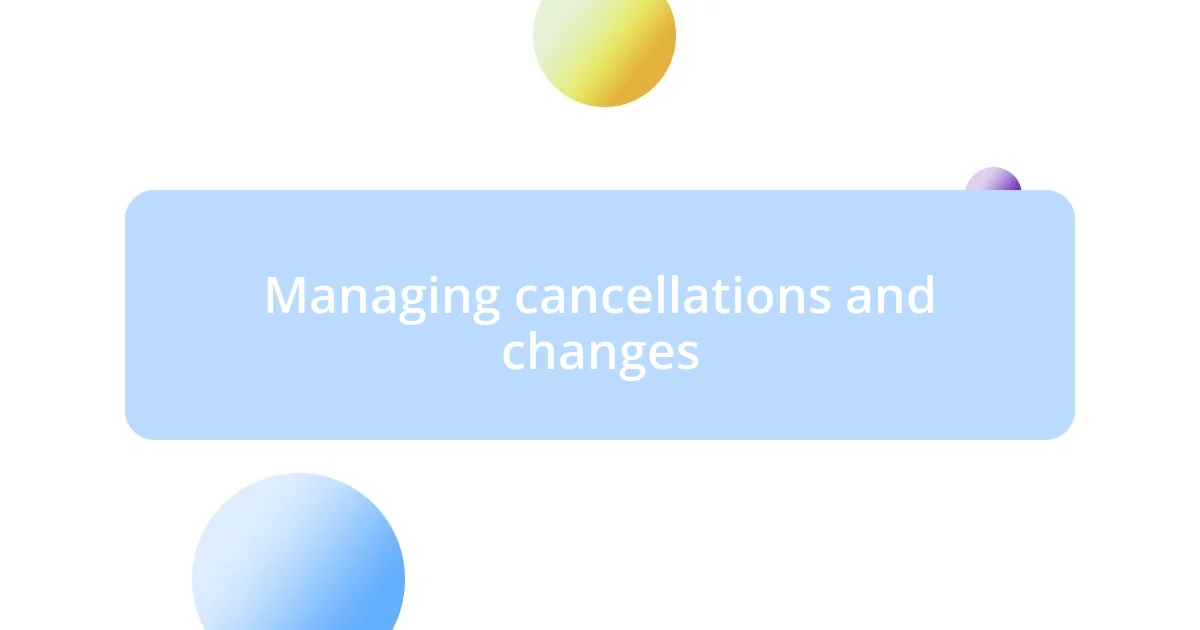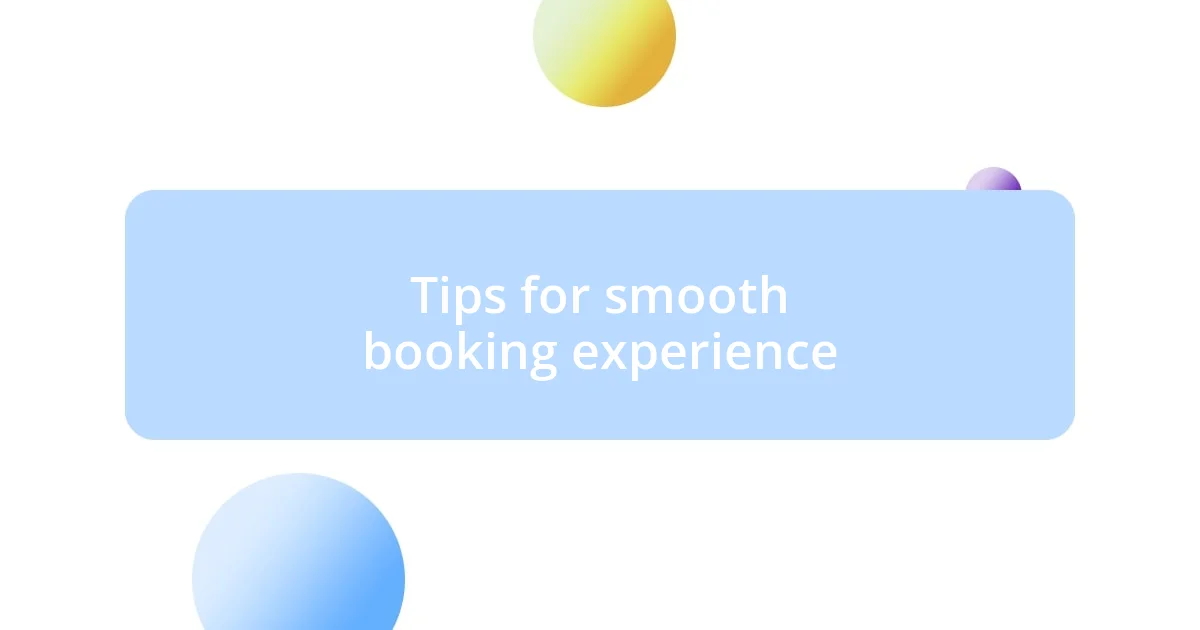Key takeaways:
- Online booking offers convenience, real-time comparisons, and access to customer reviews, enhancing the travel planning experience.
- Choosing the right booking platform involves evaluating user reviews, customer support, price comparison tools, and cancellation policies.
- Timing bookings strategically and managing cancellations proactively can lead to significant savings and reduced travel stress.

Understanding online booking benefits
Booking online has revolutionized the way we make travel arrangements. I remember the first time I booked a flight online; the thrill of instantly securing my ticket without being stuck on hold for hours was indescribable. Doesn’t the convenience of clicking a button from your couch instead of trekking to a travel agency sound appealing?
One of the standout benefits I’ve experienced is the ability to compare options in real time. I’ve spent countless evenings exploring different airlines and accommodation prices, tweaking my travel dates in search of the best deals. This level of control not only saves money but also personalizes the experience to fit my needs. Isn’t it satisfying to know you’ve found the perfect combination of price and comfort for your trip?
Additionally, many online platforms offer reviews from fellow travelers, which help guide my choices. I often read through experiences that resonate with mine, leading to better-informed decisions. It makes the process more enjoyable when I know I’m not just relying on the glossy pictures; I’m learning from others’ real-life stories. Have you ever felt that sense of assurance when planning something new? The insights shared by previous travelers can truly enhance the journey ahead.

Choosing the right platform
Choosing the right platform for booking online can dramatically impact your travel experience. I still remember the first time I used a specialized travel site instead of a generic one; it felt like I had stumbled upon a treasure chest of options! Each platform has its strengths, so I always consider what features matter most to me, whether it’s user interface, customer service, or payment options.
When deciding on a platform, I recommend looking for:
- User reviews and ratings: These give insight into the reliability of the platform.
- Customer support availability: Consider whether help is accessible if something goes wrong.
- Price comparison tools: They can save you money by highlighting the best deals.
- Mobile app functionality: A good app makes booking easier while on the go.
- Cancellation policies: Understanding the fine print can save you headaches later.
Sometimes the best platform may surprise you. I once booked accommodations through a lesser-known site that offered a fantastic last-minute deal, which created a delightful adventure in a beautiful city I had never visited before. That serendipity just reinforced my belief in exploring different booking options.

Comparing prices and deals
When it comes to comparing prices and deals, I have found that taking the time to explore multiple sites pays off beyond measure. A few years ago, I was planning a week-long trip and stumbled upon an unexpected fare difference between a few platforms. By just toggling between them, I managed to save over $150 on my flight alone! It’s fascinating how prices can fluctuate, but this reinforces my habit of never settling for the first deal I see.
To streamline my search, I often employ price comparison tools that many sites offer. They allow me to view several options side by side, and it’s like having a virtual assistant do the legwork for me. I remember a time when I used one for hotel bookings and found a fantastic discount on a premium room that included breakfast. The way it transformed my stay made me realize how these tools can enhance my travel experience significantly.
Investing in a little research pays off, too. I’ve learned that signing up for fare alerts can keep me informed about drops in prices that I wouldn’t want to miss. Just last month, I got an alert about a ticket for a spontaneous weekend getaway. The thrill of snagging that deal reminded me that patience and a watchful eye can lead to some of the best travel experiences, often at a price that feels like a steal.
| Platform | Round Trip Price |
|---|---|
| Site A | $300 |
| Site B | $280 |
| Site C | $270 |

Utilizing customer reviews effectively
When it comes to using customer reviews effectively, I always dive deep into what fellow travelers are saying. A few months back, I was planning a trip and found myself reading through dozens of reviews for a particular hotel. What stood out were the repeated mentions of a fantastic staff and a cozy atmosphere. I thought to myself, “If so many people are raving about the service, it must be true!” That gut feeling turned out to be spot on, as the hotel experience exceeded my expectations.
I pay close attention to both the positive and negative reviews. For instance, during my last vacation, a hotel had mixed reviews—some praised the location, while others complained about noise. This made me ask, “Is being close to attractions worth the potential for disturbances?” In the end, I opted for another place that offered tranquility and equally convenient access. This just goes to show how understanding the nuances in reviews can lead to a more tailored experience.
It’s also crucial to look for patterns in reviews rather than focusing on individual opinions. I once booked a popular restaurant based on one glowing review, only to find my experience didn’t match the hype. Reflecting back, I realized that several reviews warned about inconsistent service. Now, I make it a habit to check for trends; if multiple users mention the same issue, it’s a red flag I can’t ignore. I’ve learned that leveraging the collective wisdom of previous guests can help shape a much more satisfying travel journey.

Timing your bookings for savings
Timing your bookings can be a game changer when it comes to saving money. I’ve often noticed that prices tend to dip significantly during off-peak hours or days of the week. For instance, I once booked a flight on a late-night Tuesday and saved nearly 30% compared to prices I saw over the weekend. It made me realize that just being a bit strategic about the timing can lead to unexpected financial wins.
Apart from choosing the right days, I’ve found that booking in advance often brings about the best deals. When I planned a recent trip to Europe, I secured my flights almost three months ahead. The thrill of watching the airfare trend downwards each week was such a satisfying experience. I often wonder: how many travelers miss out on these savings simply because they wait until the last minute?
Another remarkable insight I’ve gleaned is the value of checking prices during seasonal changes. I once booked a vacation rental in the spring, just before the summer rush, and saved a hefty sum. I can’t help but think about how some people might overlook these nuances, but getting the timing right is a crucial part of the booking strategy that shouldn’t be underestimated.

Managing cancellations and changes
There have been times when I’ve faced abrupt changes to my travel plans, and managing cancellations became crucial. Just last year, I had a flight canceled due to an unexpected storm. I remember feeling that familiar rush of panic until I reached out to the airline’s customer service. To my surprise, they were incredibly helpful and rescheduled my flight without a fee. It made me realize the importance of knowing cancellation policies well ahead of time—doing this can save you not only money but also a lot of stress in unexpected situations.
When it comes to making changes to my bookings, I’ve learned to be proactive. For example, I once needed to change my hotel reservation because my plans shifted. Instead of waiting until the last minute, I contacted the hotel directly and explained my situation. They were willing to adjust my dates at no extra cost, which left me feeling relieved and valued as a customer. This taught me that open communication can lead to favorable outcomes that might not be outlined in the fine print of booking policies.
It’s also worth mentioning the emotional aspect of managing cancellations and changes. I find that automating reminders about my booking details helps ease some of the anxiety that comes with travel planning. After a few close calls where I missed deadlines or changes snuck up on me, I started using a travel app to track everything. Have you ever felt that rush of anxiety when you realize your plans are up in the air? With the right tools and a proactive mindset, I’ve come to appreciate that while changes can be daunting, they don’t have to derail your entire journey.

Tips for smooth booking experience
When it comes to choosing the right platform for booking, I’ve found that exploring multiple sources is essential. Last year, I was planning a road trip and sifted through several websites before booking. Surprisingly, I stumbled upon a lesser-known site that offered not just a better rate but also included free cancellation—something I never expected. Have you ever felt that rush of discovery? It’s moments like these that remind me: taking a little extra time to compare options can lead to delightful surprises.
Staying organized is another game changer. I’ve made it a habit to jot down all my booking confirmations and deadlines in one planner. There have been times when I’ve overlooked an important date, leading to a last-minute scramble. After a nail-biting experience with a hotel check-in time mismatch, I realized how crucial it is to have everything at my fingertips. How often do we underestimate the power of simply being organized? For me, it’s made a world of difference in easing my travel anxieties.
Lastly, don’t underestimate the power of customer reviews. During my recent quest for accommodation, I spent time reading reviews and even reached out to past guests for their perspectives. One particularly glowing review swayed my decision and, as it turned out, the experience matched the hype. Why is it that we often overlook this valuable resource? I believe it’s because we tend to trust the process rather than the people, but the stories shared by fellow travelers can illuminate so much more than just the statistical ratings.














